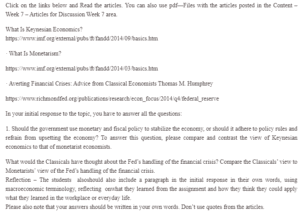Theories of Macroeconomic Development and Strategy
Fiscal policy is the most effective in stabilizing the economy than monetary policy. That is because it significantly impacts the consumer more, leading to higher employment and income levels (Jahan et al., 2014). Fiscal policy can slow or stimulate economic activity but is typically used to achieve the former. The government cuts taxes or offers tax rebates through fiscal policy to stimulate the economy. Another benefit of fiscal intervention over monetary policy is that the former can target a specific aspect of the economy, while the latter targets general financial rates (Jahan et al., 2014). For instance, with fiscal policy, the government action may target specific communities or commodities. These fiscal intervention actions are critical tenets of the Keynesian approach.
The Fed and many central banks shifted from traditional monetary policies while handling the 2007/2008 financial crisis. At the beginning of the crisis, it was clear that capping rates alone through the monetary policy would not help improve the economic situation. Knowing that policy rates could not work, the Federal Reserve used fiscal policy and liquidity tools to sustain the banking system, reduce inflation, and raise the employment level (Jahan & Papageorgiou, 2014). From a Keynesian perspective, the Fed’s response was satisfactory. However, proponents of the classical economic approach would have preferred only policy rates and liquidity tools.
The Fed’s’ response to the financial crisis has immense lessons regarding handling personal finances. A critical study is that anyone’s economic security is uncertain.
Unplanned crises may occur, calling for an app that calls for application. The economy is unlikely to recover with the traditional playbook of monetary approach. Instead, the Fed used a mix of strategies to save the situation.
References
Jahan, S., & Papageorgiou, C. (2014). What Is Monetarism? – Back to Basics – Finance & Development, March 2014. Imf.org. https://www.imf.org/external/pubs/ft/fandd/2014/03/basics.htm
Jahan, S., Saber Mahmud, A., & Papageorgiou, C. (2014, September). What Is Keynesian Economics? – Back to Basics – Finance & Development, September 2014. Imf.org. https://www.imf.org/external/pubs/ft/fandd/2014/09/basics.htm
ORDER A PLAGIARISM-FREE PAPER HERE
We’ll write everything from scratch
Question
Click on the links below and Read the articles. You can also use PDF—Files with the articles posted in the Content – Week 7 – Articles for Discussion Week 7 area.

Theories of Macroeconomic Development and Strategy
What Is Keynesian Economics?
https://www.imf.org/external/pubs/ft/fandd/2014/09/basics.htm
· What Is Monetarism?
https://www.imf.org/external/pubs/ft/fandd/2014/03/basics.htm
· Averting Financial Crises: Advice from Classical Economists Thomas M. Humphrey
https://www.richmondfed.org/publications/research/econ_focus/2014/q4/federal_reserve
In your initial response to the topic, you have to answer all the questions:
1. Should the government use monetary and fiscal policy to stabilize the economy, or should it adhere to policy rules and refrain from upsetting the economy? To answer this question, please compare and contrast the view of Keynesian economics to that of monetarist economists.
What would the Classicals have thought about the Fed’s handling of the financial crisis? Compare the Classicals’ view to Monetarists’ view of the Fed’s handling of the financial crisis.
Reflection – The students should include a paragraph in the initial response in their own words, using macroeconomic terminology, reflecting on what they learned from the assignment and how they think they could apply what they learned in the workplace or everyday life.
Please also note that your answers should be written in your own words. Don’t use quotes from the articles.


